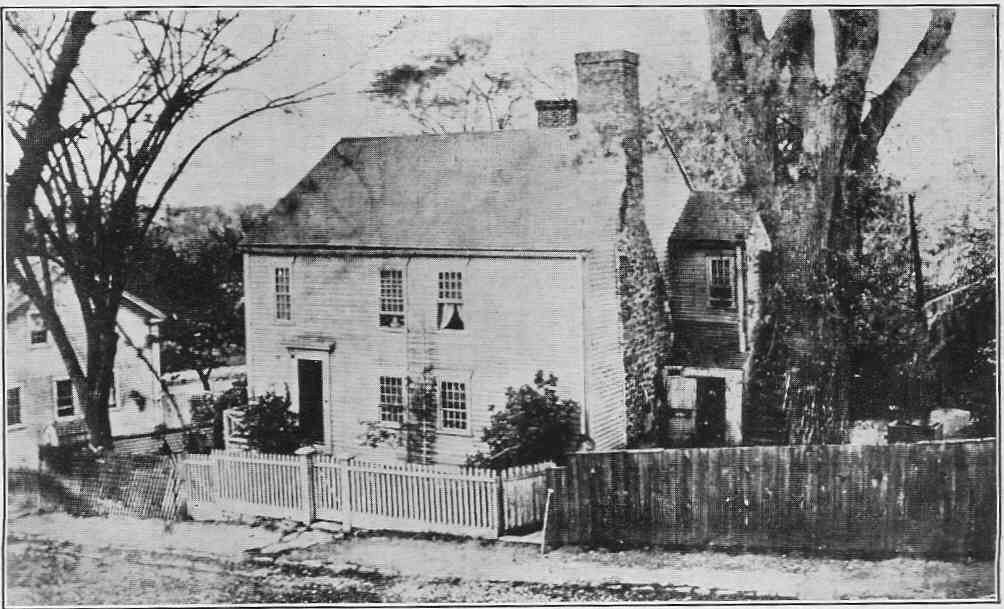[Series title page]
THE GRAFTON HISTORICAL SERIES
Edited by FREDERICK H. GRAFTON, A. M.
[Verso of series title page]
|
The Grafton Historical Series Edited by Frederick H. Hitchcock, A. M. Illustrated, 12 mo. Cloth, gilt top. The Olde Connecticut
Historic Hadley
King Philip’s War
In Olde Massachusetts
Mattapoisett and Old Rochester, Mass.
Old Steamboat Days on the Hudson River
In Olde New York State
The Cherokee Indians
Historic Graves of Maryland and the
The Witchcraft Delusion in Colonial Connecticut
Roger Williams, A Political Pioneer
Early Rhode Island
THE GRAFTON PRESS
|
Mowry Tavern, where Williams held Meetings. Built about 1653.
EARLY RHODE ISLAND
A SOCIAL HISTORY OF THE PEOPLE
BY
WILLIAM B. WEEDEN, A.M.
Author of “Economic and Social History of New England,”
“War Government, Federal and State,” etc.
THE GRAFTON PRESS
PUBLISHERS NEW YORK
ii
iii
Copyright, 1910
By THE GRAFTON PRESS
iv
| CHAPTER | PAGE | |
| I. | Foundations of Rhode Island, 1636 | 1 |
| II. | Planting in Providence, 1636-1647 | 28 |
| III. | The Island, 1638-1663 | 45 |
| IV. | The Colony and the Town of Providence, 1648-1710 | 73 |
| V. | King’s County, the Patriarchal Condition, 1641-1757 | 133 |
| VI. | Period Under Charter of Charles II., 1663-1730 | 174 |
| VII. | The Commercial Growth of Providence, 1711-1762 | 193 |
| VIII. | Newport in the Eighteenth Century, 1700-1776 | 266 |
| IX. | The South County, 1758-1787 | 279 |
| X. | Revolutionary Period, 1763-1785 | 316 |
| XI. | The Union, 1786-1790 | 353 |
| Index | 363 |
vi
viii
FOREWORD
Much has been written concerning the disputes between Massachusetts and Rhode Island. The character of the technical rights of Roger Williams in the Bay, and whether such a seditious outcast could have rights, created volumes of discussion. These questions have lost interest in the new perspective of the twentieth century.
Mr. Richman, inspired by Bryce, and coming from the great West, set forth the world-spirit of Roger Williams. Moreover, he brought forward Jellinek’s testimony to the world-wide importance of our Magna Charta “only in civil things,” which he terms the first “unrestricted liberty of religious conviction.” In the recent celebration of the memory of Calvin at Geneva, Professor Borgeaud, of the University, said: “We had above all to call up the vision of an American idea. . . . That part which is not sufficiently known in the Old World is magnificent. The man to whom it is due is Roger Williams.” In his “Modern Democracy,” he said long ago that the acceptance of the Rhode Island charter in 1647 was the “first great date in the history of modern democracy.”
The solid work of Arnold sufficiently treated the politico-theological principles of our State, and Brigham brought up the history to our day. I have freely used his authorities.
In these pages, I have studied to find out how the outcasts lived. Isolated without church or school, with few men educated by system, how did the exiles in this
x
narrow territory build up a new civilization, sufficient to attract the notice of Europe two centuries later? Liberty of the soul based on law formed a new citizen, freed from feudal restraint and ecclesiastical heredity. Charles II. gave Williams and John Clarke for their “lively experiment” a new standing place, from which to overcome the world.
Information is meager concerning the early ways of living in the society developed on Narragansett Bay; but enough exists to enlighten the story, as heretofore told, of theological controversies and political evolution. The old records both in print and in manuscript yield much that is significant of the thought and action of these striving citizens. One of the rare and very valuable collections of papers, descended from Nicholas Brown & Co., is now in the John Carter Brown library. It yielded much for our use, as shown herein. I have grubbed considerably in the inventories; for whether important or not, they are certainly true.
Let us try to comprehend the social life of our forefathers!
W. B. W.
Providence, R. I., January 1, 1910.
